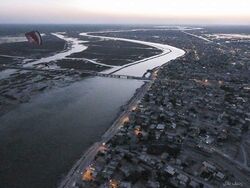Place:Al-Chibayish
Al-Chibayish الجبايش | |
|---|---|
 Al-Chibayish from the air | |
| Nickname(s): City of the Marshes | |
| Coordinates: [ ⚑ ] : 30°57′17.7″N 46°58′30.3″E / 30.954917°N 46.975083°E | |
| Country | |
| Governorate | Dhi Qar |
| District | Al-Chibayish |
| Elevation | 9 m (30 ft) |
| Population (2014) | |
| • Total | 36,100[1] |
| Time zone | UTC+3 (AST) |
| Area code(s) | 01 |
Al-Chibayish is a town on the Euphrates River in Al-Chibayish District, Dhi Qar governorate, in southern Iraq. It is the capital of its eponymous district.
Al-Chibayish is inhabited primarily by Marsh Arabs of the Beni Isad tribe. Al-Chibayish has historically been an important hub for the Marsh Arab people and a traditional boat-building center for their mashoof canoes.[2]
History
Al-Chibayish was historically home to a community of Mandaeans, as well as Arabs. In 1895, Sheikh Ṣaḥan ibn Sheikh Ṣagar (Ṣaqar in standard Arabic), a Mandaean priest, was arrested near Chabāyish in Iraq and imprisoned in Basra. He was accused of supporting an Arab tribal rebellion led by Jāsim al-Khayyūn (of the Bani Asad tribe, one of the largest tribes affiliated with the Al-Muntafiq), as well as killing his nephew. Although a petition was delivered to the British authorities to have him released, and the British attempted to assist Sheikh Sahan, he was not released and died in prison in 1898.[3]
Al-Chibayish was the subject of a groundbreaking 1955 ethnographic study, Marsh Dwellers of the Euphrates Delta, by Iraqi anthropologist Shakir Mustafa Salim.[4]
Al-Chibayish was home to about 11,000 people in 1955.[4] Al-Chibayish's population dropped to less than 6,000 by 2003 as a result of Saddam Hussein's draining of the Mesopotamian Marshes and his associated campaign of violence against the Marsh Arabs, during which Al-Chibayish was attacked by military helicopters.[5] However, the population recovered and quintupled between 2001 and 2009, when it reached an estimated 30,416 people.[1]
References
- ↑ 1.0 1.1 Brinkhoff, Thomas (July 1, 2015). "IRAQ". http://www.citypopulation.de/Iraq-Cities.html.
- ↑ Kubba, Sam (2011). The Iraqi Marshlands and the Marsh Arabs: The Ma'dan, Their Culture and the Environment. Trans Pacific Press. p. 68. ISBN 9780863723339. https://books.google.com/books?id=GoiR2Jy57LwC&q=The%20Marsh%20Arabs&pg=PA36.
- ↑ Abdullah, Thabit A.J. (2018). "The Mandaean Community and Ottoman-British Rivalry in Late 19th-Century Iraq: The Curious Case of Shaykh Ṣaḥan". Journal of the Economic and Social History of the Orient (Brill) 61 (3): 396–425. ISSN 00224995. https://www.jstor.org/stable/26572309. Retrieved 2023-07-05.
- ↑ 4.0 4.1 سليم, شاكر مصطفى (1956) (in ar). الچبايش: دراسة انثروبوجية لقرية في أهوارالعراق. بغداد: جامعة بغداد.
- ↑ Mohammad, Ahmed (13 May 2012). "الاهوار: الأهوار ترفض الاندثار وسكانها يتكيّفون مع النزوح الدائم بحثاً عن المياه". جريدة المدى. https://marshsumerian.blogspot.com/2012/05/blog-post_13.html.
 |


